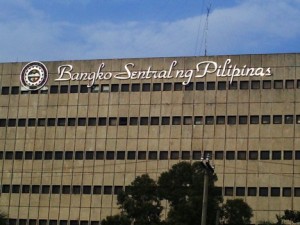BSP seen to start monetary tightening
The Bangko Sentral ng Pilipinas may begin a monetary-tightening cycle to guard against inflationary pressures by the middle of this year, likely raising key interest rates by 50 basis points for the whole year and by another 50 basis points next year, European investment bank Credit Agricole CIB said.
In a research report titled “2014 Asia Outlook and Strategy”, Credit Agricole said it also expected the Philippine peso—although battered heavily in 2013—to rebound this year to 43 against the US dollar, which would make it the second best performing Asian currency. By next year, the firm expects the peso to recover to 42 against the greenback.
Overall, Credit Agricole said the Philippines would likely stand out in terms of growth and monetary tightening in the Asian region and likewise maintain a solid current account surplus. The investment bank expects the country to return to a growth path exceeding 7 percent by 2015, outperforming all other Asian emerging markets.
Credit Agricole sees the Philippines growing its gross domestic product (GDP) this year at a slower pace of 5.7 percent from an estimated 6.7 percent in 2013. “However, gradually, the post-Yolanda reconstruction will begin to add to growth and by 2015 the economy will again be running on all cylinders, growing 7.3 percent—above the Chinese level and the most in Asia excluding Japan,” the report said.
Government spending is forecast to rebound from the slump seen in the third quarter of 2013 as administrative logjams were expected to be resolved and reconstruction from typhoon Yolanda seen to boost outlays. Gross fixed capital formation, which rose at a similar pace, would likewise do well, Credit Agricole said.
Article continues after this advertisementOn the other hand, it said trade would likely remain a drag given the superior growth of domestic demand, at 8 percent year-on-year over the past two years, the latter further boosted by the need to rebuild the typhoon-devastated areas.
Article continues after this advertisementCredit Agricole said it expected Philippine inflation to accelerate from 3.1 percent last year to 4 percent this 2014 due to supply disruptions related to the super typhoon’s impact and on increases in electricity rates.
“The BSP is trying to look through the faster price gains, hoping that they represent a one-off, but will have to be mindful of the potential for pass-through. Moreover, the central bank faces a tough task of managing the ripple effects from the Fed’s (US Federal Reserve’s) taper,” the report said.
“We anticipate significant outflows of portfolio capital from the Philippines, which will reduce the availability of funding needed for growth,” it added.
As such, Credit Agricole said the BSP was likely to begin raising rates around the middle of the year.
On the foreign exchange, Credit Agricole said the Philippine peso had lost quite a bit of its value in 2013 but attributed this—unlike in the case of other Southeast Asian peers—to central bank interventions against its own currency conducted with the view to maintaining its regional competitiveness.
The firm expects the BSP to maintain such a policy in the first half of 2014. But at the same time, it sees the Philippines standing out in terms of growth and monetary tightening and to maintain a “solid” current account surplus equivalent to 2.8 percent of GDP in 2014 and 2.1 percent in 2015 versus 4.1 percent last year.
“As a result, the Philippine peso should overcome the typhoon-related selling and rebound this year to 43 against the US dollar, which would make it the second best performing Asian currency. We also expect it to gain next year, to 42,” it said.
